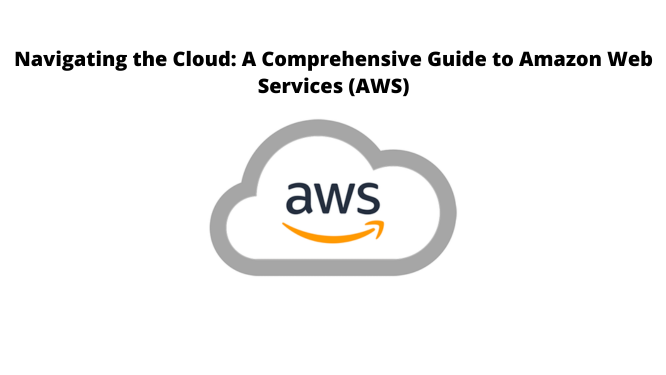
Introduction
In today’s digital landscape, the cloud is not just a technology trend; it’s a fundamental shift in how businesses and individuals store, process, and manage data and applications. Amazon Web Services (AWS), a subsidiary of Amazon, has been a driving force in this transformation. In this blog post, we will delve into the world of AWS, exploring its key components, services, and the myriad ways it empowers businesses and developers in the cloud era.
What is Amazon Web Services (AWS)?
Amazon Web Services, commonly known as AWS, is a comprehensive and highly scalable cloud computing platform provided by Amazon. Launched in 2006, AWS offers a vast array of cloud-based services, ranging from computing power and storage to machine learning and analytics. AWS enables organizations to access a wide range of IT resources on a pay-as-you-go basis, eliminating the need for large upfront investments in physical infrastructure. You can beocme an expert the in AWS Cloud industry with AWS Training in Hyderabad course by Kelly Technologies.
Key Components of AWS
1. Compute
AWS offers several computing services that cater to diverse needs:
-
Amazon Elastic Compute Cloud (EC2): EC2 provides scalable, resizable compute capacity in the cloud, allowing users to run virtual servers, known as instances.
-
AWS Lambda: Lambda is a serverless computing service that lets you run code without provisioning or managing servers. It’s perfect for executing event-driven functions.
2. Storage
Storage is a fundamental component of any cloud infrastructure, and AWS provides various options:
-
Amazon S3 (Simple Storage Service): S3 offers scalable object storage designed to store and retrieve vast amounts of data. It’s ideal for static web hosting, data backup, and content distribution.
-
Amazon EBS (Elastic Block Store): EBS provides block storage volumes that can be attached to EC2 instances, allowing you to persist data across instances.
3. Databases
AWS offers a range of database solutions to meet the needs of modern applications:
-
Amazon RDS (Relational Database Service): RDS manages relational databases like MySQL, PostgreSQL, and SQL Server, handling routine database tasks such as provisioning, patching, backup, recovery, and scaling.
-
Amazon DynamoDB: DynamoDB is a managed NoSQL database service that is highly scalable, and it can handle applications with variable workloads.
4. Networking
Networking services are essential to connecting and securing your cloud resources:
-
Amazon VPC (Virtual Private Cloud): VPC lets you create a logically isolated section of the AWS Cloud where you can launch AWS resources into your own network.
-
Amazon Route 53: Route 53 is a scalable and highly available Domain Name System (DNS) web service that routes end-user requests to globally distributed resources.
5. Machine Learning and AI
AWS offers a suite of services for machine learning and artificial intelligence:
-
Amazon SageMaker: SageMaker provides tools to build, train, and deploy machine learning models, making it easier for developers and data scientists to build AI applications.
-
Amazon Polly: Polly is a text-to-speech service that can convert text into lifelike speech, making it a valuable tool for voice applications.
6. Analytics
Data analytics is crucial in today’s data-driven world:
-
Amazon Redshift: Redshift is a fully managed data warehouse service that allows you to analyze large datasets with high performance and scalability.
-
Amazon QuickSight: QuickSight is a fast, cloud-powered business intelligence service that makes it easy to build visualizations and perform ad-hoc analysis.
7. Management and Governance
AWS provides tools to help you manage and govern your resources effectively:
-
AWS Identity and Access Management (IAM): IAM enables you to control access to your AWS resources by creating and managing users, groups, and permissions.
-
AWS CloudWatch: CloudWatch is a monitoring and observability service that provides data and actionable insights for your applications and infrastructure.
Real-World Applications of AWS
AWS has a broad range of real-world applications across various industries:
1. Startups
Startups use AWS to launch quickly, scale efficiently, and reduce infrastructure costs. Airbnb, Slack, and Robinhood are notable examples of startups that have leveraged AWS to achieve rapid growth.
2. Enterprise
Enterprise-level companies trust AWS for data storage, scalability, and flexibility. General Electric (GE), Samsung, and Capital One rely on AWS to power their digital transformation.
3. E-commerce
E-commerce platforms like Amazon.com, Zalando, and Unilever use AWS to handle surges in traffic, improve user experiences, and ensure high availability during peak shopping seasons.
4. Healthcare
AWS is a critical part of healthcare solutions that enable secure data sharing, electronic health records, and advanced patient care. Philips, Bristol-Myers Squibb, and Change Healthcare are among the healthcare organizations that use AWS.
5. Gaming
AWS provides the infrastructure for online gaming services, with companies like Supercell, Ubisoft, and Zynga utilizing its services to ensure low-latency, high-performance gaming experiences.
AWS Tools and Technologies
AWS offers a comprehensive set of tools and technologies to help users manage, monitor, and optimize their cloud resources. Some of the notable tools include:
-
AWS Management Console: This web-based interface enables users to interact with AWS services through a graphical user interface.
-
AWS Command Line Interface (CLI): The AWS CLI provides a command-line interface for interacting with AWS services, making it a powerful tool for automation and scripting.
-
AWS CloudFormation: CloudFormation allows users to define and provision AWS infrastructure as code, ensuring consistent and repeatable deployments.
-
AWS Elastic Beanstalk: Elastic Beanstalk is a Platform-as-a-Service (PaaS) that simplifies the deployment and management of applications.
The Future of AWS
As cloud computing continues to evolve, AWS remains at the forefront of innovation. Here are some trends shaping the future of AWS:
-
Edge Computing: The expansion of AWS services to the edge enables processing data closer to the source, reducing latency and improving real-time applications.
-
Machine Learning and AI: AWS continues to invest heavily in machine learning and AI services, making it easier for developers and data scientists to build and deploy intelligent applications.
-
Hybrid and Multi-Cloud Solutions: AWS is developing solutions to support hybrid and multi-cloud environments, recognizing that many organizations use a combination of on-premises and cloud resources.
-
Security and Compliance: With an increased focus on security and regulatory compliance, AWS is enhancing its security services and providing more comprehensive compliance tools.
-
Sustainability: AWS is committed to sustainability, with initiatives to use renewable energy and reduce its carbon footprint. The company is investing in data center sustainability and renewable energy projects.
Conclusion
Amazon Web Services has transformed the way businesses and developers approach infrastructure, offering a vast array of cloud services that empower organizations to innovate, scale, and adapt rapidly. From startups to enterprises, AWS is a key player in the digital transformation journey. As technology and business needs continue to evolve, AWS remains at the forefront of cloud computing innovation, making it an essential tool for those seeking to thrive in the digital age. Whether you are building the next big startup or reimagining your enterprise, AWS is a cornerstone in your cloud computing journey, providing the infrastructure and services needed to drive success and innovation.




